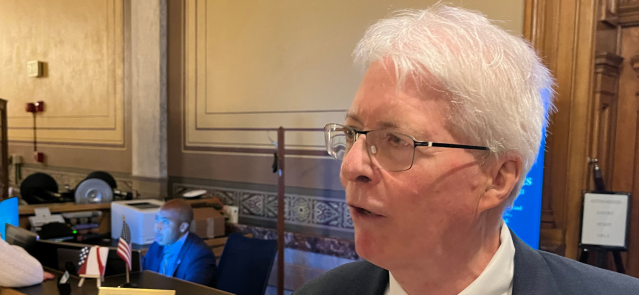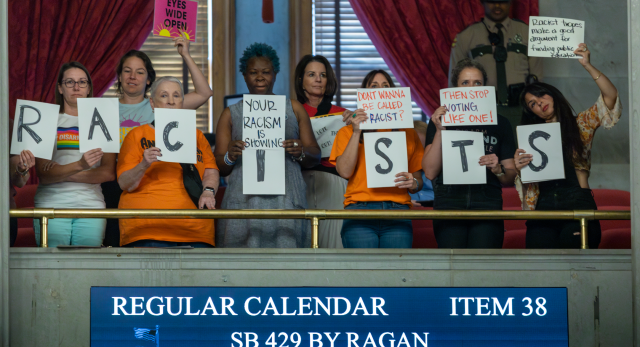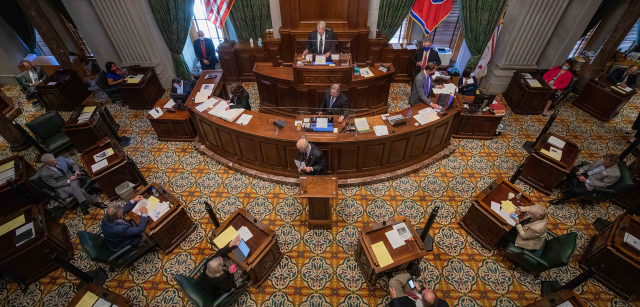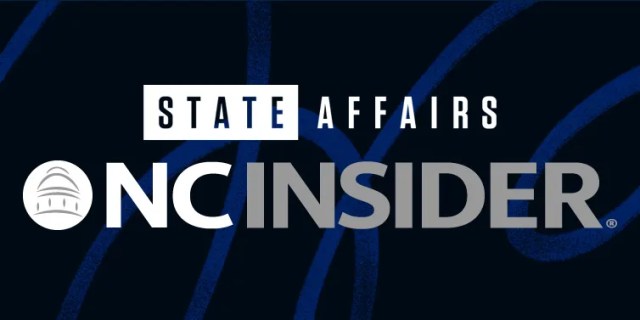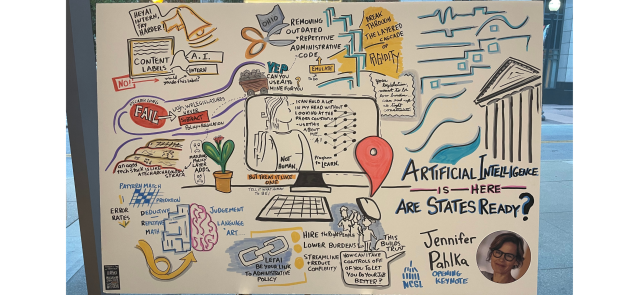YOU DON’T SAY
“I don’t know if it gave me a leg up in the search or not. I assume everybody in the search process had their own set of strengths and different attributes.”
UNC-Chapel Hill Chancellor Lee Roberts, on whether the endorsement of the General Assembly’s top leaders aided his candidacy. (The News & Observer, 8/09/24)
Debt Relief
Ames Alexander and Luciana Perez Uribe Guinassi, The News & Observer, 8/09/24
Most of North Carolina’s hospitals have agreed to sign on to Gov. Roy Cooper’s plan to ease patient medical debt, a development that will likely bring financial help to hundreds of thousands of people. More than 65 of the state’s 99 hospitals — including those owned by Atrium, Novant, UNC Health, Duke Health, WakeMed, Cone Health, ECU Health and Mission Health — have agreed to participate in the plan so far.
Hospitals had until 5 pm Friday to join the program.
Cooper’s plan, which was approved by the U.S. Centers for Medicare and Medicaid Services in late July, has the potential to relieve $4 billion in existing hospital medical debt for people in the state, his office has said. But it’s not a mandatory program so its reach is contingent on the number of hospitals that choose to participate. Those that do agree to forgive medical debts would receive higher reimbursements for treatment of Medicaid patients.
At a news conference in Charlotte Wednesday, Cooper and state Department of Health and Human Services Secretary Kody Kinsley touted the plan, which they billed as a first-of-its-kind effort to ease medical debt that has harmed hundreds of thousands. About 2 million North Carolinians are saddled with medical debt — a statewide load totaling about $4 billion, Cooper said.
“That large medical debt is a constant weight on many people, particularly when it goes to a judgment,” Cooper said. “Judgments can ruin credit. They can keep people from getting loans and credit cards and even jobs. It can drive people into bankruptcy. And one thing we’re seeing is that it also makes people avoid the preventive care that they need.”
Vice President Kamala Harris, the Democratic presidential nominee, has been “coordinating” with state officials on the medical debt plan, The Washington Post reported.
It’s unclear whether the debt relief plan would continue under future administrations. The state has applied for its implementation in state fiscal years 2024 and 2025, which run through June 2025, according to documents provided by DHHS. This makes it likely future administrations would need to renew the plan.
Vying for governor next year are Democratic Attorney General Josh Stein and Republican Lt. Gov. Mark Robinson. Asked for his thoughts about the plan, Stein told The News & Observer and The Charlotte Observer that he would “proudly continue” it and explore other opportunities to reduce health care costs.
“Governor Cooper’s plan represents a rare opportunity to create a win-win by providing financial stability for hospitals and financial relief for North Carolinians, who are crippled by medical debt through no fault of their own,” Stein said through a spokesperson. “This program is only possible thanks to Medicaid expansion, which my opponent opposes. He also wants to eliminate the Affordable Care Act and its protections for people with preexisting conditions.”
Robinson did not reply to a request for comment sent to his spokesperson. Robinson, prior to expansion, had said he didn’t think the state should expand Medicaid, The N&O reported.
Although Charlotte-based Atrium, the state’s largest hospital system, agreed to sign on to the debt-relief program, it has expressed concerns about the plan. The policy could add to the struggles of rural hospitals, leave people with less incentive to get health insurance and drive up insurance premiums, system officials wrote in a letter to DHHS Secretary Kinsley Friday.
“While we recognize and appreciate the department’s good intentions to address the troubling impact medical debt has on patients and families, we are concerned it does not address the full picture of the root causes, and it could lead to unintended consequences,” Atrium’s letter said.
UNC Health, which is participating in the program, wrote through a spokesperson that “we’re proud to support the effort to reduce medical debt” and “anticipate the plan will help millions of patients across North Carolina.” The system said it would “take more time for us to calculate the potential financial impact and to implement the policy.”
A 2012 investigation by The Charlotte Observer and N&O found that nonprofit hospitals in North Carolina were often straying from their charitable missions. Although they were getting billions in tax breaks, many nonprofit hospitals were returning relatively little to the public in the form of charity care and other community benefits.
Some, including Atrium, were suing thousands of patients who didn’t pay bills. Atrium subsequently reduced the number of lawsuits it filed, and in 2022, the hospital system stopped the practice of suing patients altogether. The newspapers’ investigation also found hospitals here were paying many of their executives millions, and inflating prices on drugs and procedures, sometimes as much as 10 times over cost.
State Treasurer Dale Folwell, a vigorous critic of nonprofit hospitals, has in recent years released a series of reports that have come to similar conclusions. In an interview Friday, Folwell said he’s concerned that the debt-relief program will do little to address longstanding problems, such as inflated hospital bills and aggressive collections practices.
“If hospitals were doing all the things they were supposed to do, there would be very little need for this program,” Folwell said. “It’s a bailout. Why should taxpayers continue to subsidize them for the things they’ve done wrong?”
At Wednesday’s news conference, Kinsley said no additional state tax dollars would be required.
North Carolina Senate leader Phil Berger called Gov. Cooper’s plan “rushed” and “political,” arguing that the legislature was better equipped to handle the problems. The Senate unanimously passed a measure called the Medical Debt De-Weaponization Act last year, but the legislation died in a House committee. “With the governor’s program, we don’t know the tax implications, the enforcement methods, or more importantly how a rural hospital that survives on a month-to-month basis is going to meet some of these immediate requirements,” Berger said in a statement emailed to the N&O. [Source]
UNC Chancellor
Korie Dean, The News & Observer, 8/09/24
The next leader of UNC-Chapel Hill will be a nonacademic whose only experience leading a university came over the past seven months, but who quickly won the support of the state’s most powerful Republican lawmakers.
Lee Roberts will be the 13th chancellor of the UNC System’s flagship campus. Nationally known and recognized, the research university has a reputation for academic and athletic excellence and, increasingly in recent years, for on-campus drama.
As chancellor, Roberts will lead the campus of more than 30,000 students and nearly 14,000 faculty and staff. Roberts, a former state budget director under Republican Gov. Pat McCrory, has served as interim chancellor since Kevin Guskiewicz left the job in January to become president of Michigan State University. The UNC System Board of Governors on Friday morning approved UNC System President Peter Hans’ selection of Roberts in a virtual meeting.
Roberts resigned from the legislature-appointed Board of Governors to take the job as UNC-Chapel Hill interim chancellor in January.
Except for his 16-month stint as budget director nearly a decade ago, Roberts has spent most of his career as a private investment manager. Appointing a campus leader without a Ph.D or a career in higher education has become somewhat more common in recent years, but is a first at UNC-Chapel Hill in modern history.
Hans, in his remarks during Friday’s meeting, said this moment at the university demands “fresh eyes” that can make difficult decisions using a range of experiences. “Every era is unique in its challenges and the possibilities it presents, and as a result, every chancellor search is different,” Hans said, adding: “We have found the right leader for this moment in Carolina’s history because the questions facing public higher education are wide ranging, enormously complex and likely to become magnified in the years ahead.”
In his first public remarks following Friday’s announcement, Roberts said he thinks there “is no higher calling” than supporting the university’s mission. “To me, this university stands, above all else, for the ideal of public service, for helping the people of this state and all those who are touched by this place to achieve their greatest potential,” Roberts said. “As chancellor, I promise to be guided by that principle as we work together to carry North Carolina into the future.”
Roberts, who holds a law degree from Georgetown University, starts his appointment on Aug. 12, one week before the new academic year begins. He will make an annual base salary of $600,000, according to an appointment letter provided to The News & Observer by UNC System spokesperson Andy Wallace.
Roberts, who is an unaffiliated voter, takes the job knowing House Speaker Tim Moore and Senate leader Phil Berger, both Republicans, support him. Both publicly praised his handling of pro-Palestinian protests on campus in late April, particularly after he led police to restore the American flag to a campus flagpole when protesters tore it down.
Berger after the protests said that Roberts “did exactly what needed to be done” and that he was “as proud as I can be of him,” adding that there was “no question” he should be made chancellor permanently. Moore said he had conveyed to Hans his preference for Roberts to become chancellor.
That public support from the General Assembly’s top leaders contrasts with their statements about Guskiewicz. In 2021, as rumors circulated among faculty that lawmakers might try to oust the now-former chancellor, both Berger — who had previously described the university under Guskiewicz’s leadership as “rudderless” — and Moore stopped short of explicitly expressing confidence in Guskiewicz when pressed by reporters.
It also contrasts with the faculty’s assessment of Roberts’ actions. Nearly 900 faculty and staff signed a letter denouncing Roberts’ and other administrators’ actions during the protests, while more than 5,000 people signed an online petition expressing their lack of confidence in Roberts following the events.
Beth Moracco, the university’s Faculty Council chair, told The N&O on Thursday that the next chancellor will need to rebuild trust with faculty and others after his actions during the protests.
Many faculty are also concerned that the university’s shared governance structures have been disregarded in recent years, with decisions normally left to faculty — such as those related to curricula — in some cases being directed by administrators and board members. “I think anyone stepping into this role is going to have to authentically engage with faculty, staff, students and other stakeholders,” Moracco said.
Moracco, who has met regularly with Roberts over his months as interim, said she has found him accessible and eager to learn while the interim leader. “He is very willing to listen to people who don’t agree with him or who have a different position on an issue,” she said. “So that is encouraging.”
State lawmakers do not hold authority over a chancellor search, but they — using the speaker and Senate leader’s recommendations — appoint some members of the campus-level Board of Trustees and all members of the Board of Governors. Both boards have official roles in the process, including narrowing the field of applicants to a list of finalists and approving Hans’ selection, respectively.
Sue Estroff, a professor in the School of Medicine and an elected member of the university’s Faculty Executive Committee, told The N&O on Wednesday that she believed Moore and Berger’s comments supporting Roberts meant “that was it” for the search and Roberts would be given the chancellorship.
She wondered — and asked the university’s provost multiple times, she said — how the search would continue to attract candidates, given that some of the state’s most powerful players had voiced their opinion. She also compared the search process to a theater performance with a see-through curtain. “All of us in the audience can see right through it, but the performance goes on,” she said.
Asked by The N&O on Friday whether he believed lawmakers’ support improved his chances of securing the job, Roberts said, “I don’t know if it gave me a leg up in the search or not. I assume everybody in the search process had their own set of strengths and different attributes.”
Cristy Page, the executive dean of the UNC School of Medicine and the chair of the search committee, told reporters last week after closed-door candidate interviews that she did not think Roberts’ time as interim chancellor, nor Moore or Berger’s comments, had impacted the applicant pool.
A UNC System news release said nearly 60 candidates applied for the position during the national search.
Roberts told The News & Observer that he planned to do the job “in a nonpartisan way.” [Source]
Olympic Visit
Ray Gronberg, Business NC, 8/09/24
N.C Senate leader Phil Berger, four other state senators and Rep. Kyle Hall traveled to Paris late last month to learn about organizing massive sporting events such as the Summer Olympics.
The nonprofit Opportunity for North Carolina paid for the July 25-29 trip, according to Woody White, the Wilmington lawyer who chairs Opportunity for North Carolina. He is a Senate-appointed member of the UNC System Board of Governors. The group’s objectives include a “desire to attract major sporting events to North Carolina,” he said. The Olympics offered a chance to learn “about the infrastructure, security and other foundational undertakings required for a major sporting event at scale.”
Policymakers have supported efforts to recruit such events as this summer’s U.S. Open golf tournament in Pinehurst and the 2023 NHL Stadium Series game in Raleigh, White said.
Recently, there’s been talk of trying to land a Major League Baseball team in Raleigh. Former Berger Chief of Staff Brian Fork recently joined Hurricanes Holdings as CEO of the company owned by Dallas investor Tom Dundon, who has praised Raleigh as a potential MLB city. And “there have been discussions of beginning to make long-term plans to try to recruit the Olympics to North Carolina at some points in the future,” White said.
Others making the trip with Berger and Hall were Sens. Bill Rabon, David Craven, Michael Lee and Danny Britt.
The group arrived on July 25 and visited Atos, the Games’ IT partner, for a briefing on telecommunications and cybersecurity. They later had a dinner briefing from Opportunity for North Carolina “on the economic impact of successfully recruiting the World Military Games or the Pan Am Games” to North Carolina, White said.
Other activities included a lunch presentation from USA Field Hockey, whose national team trained at a UNC Charlotte field paid for by the state-funded U.S. Performance Center; meetings with USA Olympics officials and a presentation about the Games International Broadcast Center. The last full day, July 28, included a presentation from the CEO of USA Table Tennis and a meeting with leaders of World Rugby. The group flew home on July 29. Their itinerary included attendance at the Games’ opening ceremony.
White said the U.S. Performance Center did not fund the trip but had a role in the visit. The nonprofit formed by Charlotte’s Ike Belk and David Koerner has been trying to entice U.S. Olympic teams to operate in North Carolina. They have developed “the industry relationships to connect policymakers with Olympics organizers in Paris,” White said. But “feedback from the [State] Ethics Commission” prompted White’s group to decide “not to allow” the center to foot the bill, and “eliminate any USPC influence over the trip.”
As a result, the group is reimbursing the Performance Center for expenses and took control of the itinerary. The group “went so far as to segment its own accounts to make certain that zero contributions from lobbyists or lobbyist principals paid for any part of the educational trip,” White said. He forwarded a copy of a July 19 email from State Ethics Commission Executive Director Kathleen Edwards that said the state’s ban on direct or indirect gifts “would not apply to restrict OFNC, a non-lobbyist principal, from inviting and paying the expenses of legislators attending the trip.”
The Performance Center has been in the news because of its use of a $25 million state budget allocation in 2021, and $30 million in 2023 to an affiliated nonprofit, the N.C. Sports Legacy Foundation. The Office of State Budget and Management’s internal auditors are reviewing the finances of both organizations, the News & Observer reported Wednesday.
Separately, The Assembly reported that the nonprofit has spent $45.5 million of the $55 million as of June, citing the state budget office. The state money was supposed to fund capital needs, but only about $10 million has paid for facilities or equipment. Roughly $7 million went for the Charlotte field hockey pitch, which was built by Pembroke-based construction firm Metcon.
Otherwise, the Performance Center spent $9.8 million on its own consulting services, $4.5 million to outside consultants and $2.9 million in personnel costs, including $800,000 in salaries for Belk and Koerner over two years, the Assembly reported. Other money went to support various U.S. Olympic sports programs, none of which have relocated to North Carolina.
Center officials said the group is a finalist to host the 2027 Military World Games, which attracts athletes from 120 nations. The Performance Center employs a lobbyist, Jarret Burr. The Sports Legacy Foundation also retained Burr and The Southern Group’s Kevin Wilkinson.
Opportunity for North Carolina doesn’t have a lobbyist. White is a former New Hanover County commissioner and a former state senator. [Source]
Sports Betting
Brian Murphy, WRAL News, 8/09/24
North Carolina collected more than $50 million in fees and taxes from legalized sports betting in the fiscal year that ended July 1. That’s despite not launching until mid-March and not counting June’s tax receipts because they were not due until July 20.
More than $1.8 billion was bet in North Carolina through May 31, a figure that includes free or promotional wagers. Operators collected more than $234 million in revenue, based on North Carolina’s calculations. That revenue is taxed at 18% under state law, so the state collected nearly $42 million in taxes. That’s in addition to $9 million in licensing fees. Operators paid $1 million for a five-year license and other suppliers were required to pay as well.
The state’s betting law dictates how the revenue is distributed. Here’s a breakdown of where the tax money went, according to the Department of Revenue:
- $41,780,571.51 in taxes collected
- $2,150.26 to the Department of Revenue for administrative expenses
- $2 million to the Department of Health and Human Services
- $1 million to North Carolina Amateur Sports
- $1 million to the North Carolina Youth Outdoor Engagement Commission
- $10,675,684.24 to athletic departments at UNC System schools that play; intercollegiate athletes (except NC State and UNC). Each school received an equal share of $821,206.48
- $10,163,526.37 to the state’s new Major Events, Games and Attractions Fund
- $16,939,210.64 to the General Fund
The Department of Revenue said it didn’t collect any of the fees and didn’t pay any money to the North Carolina Lottery Commission out of the taxes collected on sports wagering because the lottery did not submit anything for reimbursement.
The Lottery Commission said it was reimbursed more than $1.75 million for expenses in the last fiscal year. The state collected more than $7.2 million in taxes for sports betting in June, which will be accounted for in the current fiscal year. Figures for July should be released soon. [Source]
Debby Rain
Ron Todt and Holly Ramer, The Associated Press, 8/11/24
The weather system previously known as Hurricane Debby was not quite done with parts of the U.S. Sunday as flood warnings remained in effect in North Carolina and thousands were without power in New York, Ohio and Pennsylvania.
After hitting Florida as a hurricane Aug. 5, the storm spent nearly a week unleashing tornadoes and flooding, damaging homes and taking lives along the East Coast before moving into Canada on Saturday.
While many rivers had receded by Sunday, flood warnings remained in effect across central and eastern North Carolina, where more thunderstorms were possible over the next few days. With the ground already saturated from Debby, the National Weather Service said localized downpours could result in additional flash flooding throughout the coastal Carolinas.
Authorities in Lumberton, N.C., said in a Facebook post Saturday that one person died after driving into floodwaters on a closed road and getting swept away. Officials didn’t identify the driver, but said that what they hoped would be a post-storm rescue, quickly turned into a recovery. “It bears repeating,” the agency said in the post. “Never drive into flooded roadways and obey road closed signage.”
Meanwhile, the National Hurricane Center is tracking another potential tropical storm in the Atlantic. Officials said a tropical depression is likely to form within the next day or two and could approach portions of the Greater Antilles by the middle of the week. [Source]
Insurrection Video
Avi Bajpai, The News & Observer, 8/10/24
A newly surfaced video shows Michele Morrow encouraging then-President Donald Trump to invoke a federal law that she said “completely puts the Constitution to the side,” and would allow him to use the military to stay in power. Morrow, the Republican nominee for state superintendent of public instruction, made the comments in a video she recorded on the night of Jan. 6, 2021, according to CNN, which published the video Friday evening.
Morrow protested outside the U.S. Capitol earlier that day, but has said she didn’t enter the building. In the video, Morrow said that Trump had the ability while he was president, in the final days of his term before it ended on Jan. 20, 2021, to take action to keep himself in power.
Morrow said that Trump could have invoked an “executive order against voter fraud,” and says Trump also could have invoked the Insurrection Act, a law dating back more than two hundred years, to use the military to remain in office. “President Trump is still president, until the 20th. So, he can still invoke the executive order against voter fraud. And now, he has every player that participated in his sights, and they can all be arrested for treason,” Morrow said in the video. “And if the police won’t do it, and the Department of Justice won’t do it, then he will have to enact the Insurrection Act, in which case, the Insurrection Act completely puts the Constitution to the side, and says, now, the military rules all.”
In a statement to The News & Observer on Saturday, Morrow’s campaign said she was focused on the race to run North Carolina’s public schools. The campaign didn’t address the video, but slammed CNN for “gaslighting the public” about her.
Asked about Morrow’s video, NCGOP spokesman Matt Mercer declined to comment.
The N&O also reached out to GOP leaders in the legislature, but their spokespeople did not immediately respond.
Morrow, a registered nurse, conservative activist, and homeschool parent, defeated incumbent Superintendent Catherine Truitt in the GOP primary in March. Morrow’s victory was a major upset, since managed to overcome Truitt’s major fundraising advantage and endorsements from several top Republican state lawmakers.
She is running against Democrat Mo Green, the former superintendent of Guilford County Schools, and former executive director of the Z. Smith Reynolds Foundation, a group that funds progressive causes.
The superintendent’s race has drawn national attention because of scrutiny of Morrow’s past social media posts, including those that talked about killing President Joe Biden, former President Barack Obama, North Carolina Gov. Roy Cooper and other Democrats.
After CNN reported on those since-deleted posts in March, following her primary win, Morrow said that the network was “trying to interfere in the 2024 election.”
Two major North Carolina donors, developer John Kane and businessman Bob Luddy, held a fundraiser for Morrow in Raleigh in April.
House Speaker Tim Moore, who is currently running for Congress, also said he would support Morrow’s campaign, telling reporters in April that he didn’t think the past comments he had seen from Morrow were “appropriate at all,” and that he wouldn’t “condone” them, but that he was going to support all of the Republicans running for office.
One exception is U.S. Sen. Thom Tillis, who publicly said he wouldn’t endorse Morrow after her social media posts about the killing of prominent Democrats came to light. [Source]
Storm Recovery
Greg Barnes, CityView, 8/10/24
After years and many struggles, it appears that the state is well on its way to solving its disaster relief funding issues. Concerned about the slow pace of distributing federal long-term disaster aid money to victims of Matthew and Florence, Gov. Roy Cooper in 2019 established the North Carolina Office of Recovery & Resiliency to take over the job of meeting the needs of storm victims, past and future. Initially, the Office of Recovery & Resiliency didn’t fare much better than other departments that had been tasked with the job.
Figuring out who is entitled to the federal disaster aid is complicated. Questions often arise about heirship disputes, unpaid property taxes, easement concerns and myriad other issues, said Janet Kelly-Scholle, a spokesperson for the Office of Recovery & Resiliency.
But the pace of putting people back in their homes accelerated after the office made program and policy changes to expedite storm victims through the recovery process. From August through December of last year, the office had completed an average of 63 homes a month statewide, Kelly-Scholle said in an email. A year later, it is averaging 100 homes a month.
Statewide, 2,491 families have returned home out of 4,356 within the program. The vast majority of those still waiting are in the contract and bid work phase or are experiencing actual construction. No one is waiting in the intake phase, state records show.
In Cumberland County, the Office of Recovery & Resiliency has enabled 179 families to return to their homes or to new homes. But 53 more families or individuals in the county are still waiting.
The state has until Aug. 15, 2025, to disburse $237 million in federal disaster aid for Hurricane Matthew and until Aug. 17, 2026, to disburse $543 million for Hurricane Florence. As of July 24, it had doled out $231 million of the Hurricane Matthew money and $435 million designated for Florence, Kelly-Scholle said. North Carolina is on track to be the first in the nation among 2016 grantees to close out the money for Matthew and could be the first for Florence, she said.
That’s a far cry from a few years ago — before the Office of Recovery and Resiliency was created — when the state was in jeopardy of losing disaster-aid money because it wasn’t allocating it fast enough. [Source]
Lincoln Project
Will Doran, WRAL News, 8/09/24
North Carolina has tens of thousands of moderate Republicans — and some solidly conservative voters — who have the potential to help Democrats flip the state blue in November. Swaying those voters isn’t a guarantee. But they’re gettable, said Rick Wilson, the former Florida GOP operative who’s now a leading national voice of the “Never Trump” movement.
He hopes he can convince enough of them to prevent Republican former President Donald Trump from getting the state’s 16 electoral votes — part of the group’s broader effort to block Trump’s return to the White House.
In an exclusive interview with WRAL, Wilson confirmed that his group, The Lincoln Project, is readying to reach out to conservative voters across North Carolina in the coming days using highly targeted ads to convince them that Trump is still unfit for the presidency.
That focus on North Carolina wasn’t decided until very recently. When President Joe Biden was still running for reelection, Wilson said, the polling made North Carolina look no longer competitive. Trump had too big of a lead. But the polls have changed substantially in the weeks since Biden dropped out, replaced by Vice President Kamala Harris.
“We have expanded our swing state map as the numbers in the post-Biden moment have shifted rather radically,” Wilson said.
It’s the latest move indicating that moderates and some disaffected Republicans think Harris can win in North Carolina. Last week, the Harris campaign launched its North Carolina chapter of the group “Republicans for Harris” with support from several former GOP politicians and party activists.
The polling firm Redfield & Wilton Strategies found Trump leading Biden by 6 points in North Carolina in mid-July. More recently, it found the Democrats’ switch to Harris had cut Trump’s lead in half, down to 3 points. A Bloomberg/Morning Consult poll found that Trump had only a 1-point lead over Harris in North Carolina, indicating essentially a tied race.
Republican leaders in North Carolina say they’re not concerned about the efforts, by groups like The Lincoln Project and Republicans for Harris, to chip away at Trump’s support within the party and stop him from winning the state for a third straight time. U.S. Rep. Dan Bishop, a member of the hardline Freedom Caucus and this year’s GOP nominee for state attorney general, said he doesn’t worry about the battle for moderates. Harris, he said, is more far-left than Trump is far-right.
“I don’t honestly believe you can make the case that either Donald Trump or JD Vance are anything out on the wing of the Republican Party in the way that Kamala Harris and Tim Walz are on the Democratic Party,” Bishop said. “They are way outside the mainstream.”
In this year’s primary election, more than 280,000 North Carolinians voted against Trump in the Republican Party primary. Most backed former South Carolina Gov. Nikki Haley.
“We don’t have to go into Wisconsin or North Carolina or Georgia and move a million voters,” Wilson said. “We have to move a few hundred thousand voters here or there.” [Source]
Trump Campaign
Karen Chávez, Asheville Citizen Times, 8/10/24
Former President Donald Trump will be making a campaign stop in Asheville on Wednesday, Aug. 14, he announced on his website. Trump will appear at Harrah’s Cherokee Center in downtown Asheville. Doors will open at 1 p.m. and he is expected to speak at 4 p.m. about the economy.
Trump “will deliver remarks on the economic hardships created by the Harris-Biden Administration in Asheville, North Carolina,” his announcement reads in part.
Trump made an appearance in the same venue – which was then known as the U.S. Cellular Center – in 2016 when he was campaigning for the presidency against Hillary Clinton. [Source]
Milk Program
David Ford, WFDD Radio, 8/09/24
In celebration of National Breastfeeding Month this August, North Carolina’s Human Donor Milk Program is expanding across the state to better meet the need for more services.
In order to grow into healthy babies, newborns need a consistent, nutrient-rich food source. Breastmilk, with its easily absorbable carbohydrates and protein, is well suited for the task. And its life-saving antibodies help ward off infections. That can be particularly important for infants who are born prematurely. Over the past decade, preemies have accounted for just over 10% of live births in North Carolina. Many are unable to breastfeed, and sometimes their mothers can’t provide enough milk.
To help meet that demand, the state Department of Health and Human Services in partnership with WakeMed, is expanding North Carolina’s Human Donor Milk Program with five new donor depots in counties across the state from Mecklenburg to Pasquotank. The five new donor depots are located in Fayetteville, Durham, Sylva, Charlotte, and Elizabeth City. All milk banking locations are seeking donors. [Source]
Rural Hospital
Jaymie Baxley, NC Health News, 8/12/24
It has been little over a year since Martin County, a rural community of 22,000 in eastern North Carolina, lost its hospital.
Martin General served generations of local families during its seven-decade run in Williamston, the county’s seat of government. People born at the hospital returned to witness the births of their own children and grandchildren. Some lifelong residents drew their first — and last — breaths at the 43-bed facility. But as the county’s population began to dwindle in the 1990s, so did the for-profit hospital’s revenues. Teetering on the brink of bankruptcy, Martin General attempted to cut costs by discontinuing maternity services in 2019 and shuttering its intensive care unit in 2021. The changes weren’t enough to keep the struggling hospital afloat. In August 2023, Martin General announced it would close after 73 years in business.
“Though this is a very emotional decision, Martin General Hospital is no longer accepting patients, including emergency patients, and the hospital has filed for bankruptcy,” Quorum Health, the hospital’s owner, said in a statement at the time, adding that Martin County’s Board of Commissioners “chose not to respond” to a proposal that would have transferred ownership of the facility to the county.
In a Facebook post disputing the company’s version of events, the county wrote that commissioners had met to discuss the terms of the transfer and instructed their attorney to “ask for additional information” on Aug. 1. The county said it learned the next day that Quorum had “closed the doors of Martin General.”
Citizens of Martin County, where the median household income is only $44,799 a year (compared with the N.C. median household income of $66,186), responded to the closure with concern and outrage. Losing Martin General meant they would be forced to travel more than 20 miles to the nearest emergency department in neighboring Beaufort County. They wondered how their elected leaders could allow this to happen.
But the county had been working for several months on a complex plan to resurrect Martin General — a plan that, if successful, could become a blueprint for other rural communities where hospitals have closed.
When Congress passed the Consolidated Appropriations Act of 2021, it created a lifeline for struggling hospitals in rural areas, allowing small facilities with less than 50 beds to convert to so-called “rural emergency hospitals.”
In exchange, the hospitals would receive up to $3.2 million in annual funding from the federal government. They would also be eligible for increased reimbursement rates for some certain outpatient services covered by Medicare.
The catch? While rural emergency hospitals are required to provide 24/7 emergency care, they are not allowed to offer inpatient services. These inpatient services, which range from elective surgeries to childbirth, tend to make up a large share of traditional hospitals’ revenue. A 2018 study by the American Hospital Association found that inpatient services accounted for more than half of all revenues reported by community hospitals from 1995 to 2016.
It’s a trade-off that some hospitals appear willing to make. Twenty-nine facilities across the U.S. have converted to rural emergency hospitals since the program launched in January 2023, according to data from the Cecil G. Sheps Center for Health Services Research at the University of North Carolina.
Unlike Martin General, those hospitals were still in business when they made the switch. Officials in Martin County, however, believe the hospital can be reopened using the rural emergency model — something that has not been attempted anywhere else in the nation.
The hospital will benefit from a 2015 law passed by the General Assembly that makes it easier for a shuttered hospital to get back into business if the reopening takes place within a two-year window after the initial closure.
Dawn Carter, health care consultant for Martin County, said a study conducted by her firm in early 2023 found that the rural emergency hospital program would “be a really good fit” for Martin General, whose financial difficulties were by then well known. The problem, she said, was that the North Carolina General Assembly had yet to adopt a state budget with language allowing the state’s hospitals to participate in the program. Quorum closed Martin General in 2023 before a budget finally passed — months behind schedule — that October.
Earlier this year, the Centers for Medicare and Medicaid Services confirmed that Martin General could reopen as a rural emergency hospital, clearing the first and arguably most important hurdle in the county’s path. But Carter said there are still some obstacles left to overcome. “I don’t want to give false hope to that community, so we’re telling them what we know when we know it,” Carter said. “And right now, it’s just not determined.”
According to the Sheps Center, nearly 150 rural hospitals across the U.S. have either closed or drastically scaled back their services since 2010. Twelve of those facilities are in North Carolina, the center reported. [Source]
Transit Tax
Steve Harrison, WFAE Radio, 8/09/24
Managers of the city of Charlotte, Mecklenburg County, and five of the six county towns said Friday that they have finished writing a bill to create a new transit authority … and to possibly raise the countywide sales tax by one cent to pay for transportation improvements.
In a statement, the managers said they will ask elected officials in each governing body to pass resolutions supporting the authority and tax increase.
Republican lawmakers would have to approve the bill. Mecklenburg voters would then decide in a referendum on whether to raise the sales tax. That could come in November 2025. WFAE has reported earlier that the bill would only allow 40% of the new sales tax money to be spent on rail transit; 40% would be spent on roads and 20 % on buses.
On Monday, Matthews’ town board plans to vote on a resolution opposing the new tax. Leaders there are upset that plans for light rail to the east have been swapped out for a bus line to Matthews. [Source]
Fishery Management
Brenna Flanagan, Port City Daily, 8/11/24
Recreational fishermen have been barred from catching the state’s most valued finfish, the Southern flounder, this year because they exceeded last year’s quota. But anglers say this season’s cancellation reflects a larger management issue at the state level. The Division of Marine Fisheries, part of North Carolina’s Department of Environmental Quality, announced the cancellation of the season, set for two weeks in September, on May 23.
Calculations from the 2023 season indicate the recreational catch of Southern flounder exceeded the quota allowed under the stock rebuilding plan set by the state in 2022.
Over two decades ago, state researchers determined Southern flounder were overfished and overfishing was occurring. The two terms carry different meanings: overfished is when a population is below a level needed to sustain itself, and overfishing means they are actively being caught at an unsustainable rate.
Limits were put on recreational and commercial anglers with the goal of rebuilding the flounder population. Per the current management plan, commercial fishermen are allocated 70% of the stock while recreational anglers get 30%, based on the proportion of flounder historically caught by commercial and recreational fishermen. However, the goal is for the groups to reach parity in 2026.
According to NCDEQ, the 2023 recreational quota was 114,315 pounds, but the estimated catch for 2023 was 241,609 pounds, resulting in an overage of 127,294 pounds.
Commercial fishermen have a larger share of the flounder take, along with better tools to track catches. However, recreational licenses outnumber commercial fishermen, who have been on the decline since the ‘90s. As of April 2023, there are an estimated 1.5 million recreational licenses in North Carolina and between 18 and 20 million recreational trips leaving from the coast annually. There are less than 6,000 commercial licenses, half or more inactive, while recreational fishermen have been bringing in more fish than commercial in recent years.
This perceived inequity between commercial and recreational fishermen has caught the eye of one local lawmaker.
Rep. Frank Iler, R-Brunswick, sent an open letter to NCDEQ on July 10 denouncing the cancellation and the state agency’s management of the flounder fishery. “I hate to compare this to the Covid lockdown, where the scientists and bureaucrats shut down the economy based on sketchy data and selective science. However, it is hard not to, at least on a smaller scale,” Iler wrote.
Iler warned of the effects the cancellation will have on charter fishing and the marine industry, which draw visitors to local coastal communities whose economies rely on tourism dollars.
“If our DMF cannot come up with a better fishery management plan at least by 2025, perhaps we need to go to the floors of the N.C. House and Senate, hear from citizens and objective experts, and come up with a plan for them,” Iler states in his letter.
The next meeting of the Marine Fisheries Commission will take place Aug. 21–23. [Source]
Port Report
Ray Gronberg, Business NC, 8/08/24
The State Ports Authority says it had “mixed, yet balanced results” in its fiscal year ending June 30, highlighted by better-than-expected showings in the number of containers it moved by rail and the amount of bulk and breakbulk cargo. The Ports Authority’s announcement omitted mention of its actual financial results. That information will be including in an annual report filed later this year by the state auditor.
Last year’s report showed an annual operating loss of $58,904, along with a $49.7 million increase in the authority’s net capital position, driven mainly by state appropriations. Revenue was about $77 million in 2022-23.
Executive Director Brian Clark said the authority had “a record year for intermodal volume” in 2023-24, with some 17,000 containers moving by rail, 13% more than budgeted.
Wilmington and Morehead City also handled about 4.2 million tons of bulk and breakbulk goods, about 5% more than expected. It was less than the nearly 4.6 million tons in the previous fiscal year. That was a record for the ports, which are an agency of the N.C. Department of Transportation. “Both ports handled substantial volumes of natural rubber, steel, lumber, cement, wood chips and wood pellets, supporting everything from U.S. infrastructure, aerospace and the region’s growing automotive industry,” the authority said.
It acknowledged headwinds from “global industry challenges in the container market” but said the addition of new service from Central America helped.
The ports are trying to add to their capacity in various ways. One such project is a new rail year that when finished will be able to support 50,000 container movements a year. The by-rail numbers understate the ports’ total container traffic, given that only 9% or so of it moves by train.
Last year’s report published by the auditor said the authority moved 171,063 containers total in fiscal 2022-23. Annual moves have been in the general neighborhood of 150,000 containers for the last half-decade. [Source]
Superintendent Departure
Port City Daily, 8/09/24
The separation between former Superintendent Charles Foust and the New Hanover County Schools district is final. According to documents released by the school board, both parties signed off on the matter in the last two weeks. The school board voted unanimously — with Stephanie Kraybill and Josie Barnhart absent — on July 2 to terminate Foust, the district’s first Black superintendent hired in 2020.
Foust will receive $256,927.23, the total annual aggregate salary he was set to earn beginning the new fiscal year, July 1. This includes the 3% raise passed by the North Carolina General Assembly last year; the agreement notes there was a dispute about this as it was ratified after Foust’s separation, but the two parties settled it.
“The parties all desire to buy their peace, resolve their dispute, and settle any and all other potential disputes between them without resorting to litigation,” the agreement states. Thus, Foust must refrain from any claims of wrongful discharge, retaliation, discrimination, breach of contract or unpaid wages, bonuses, insurance, vacation, expenses and the like. He also signed off on abstention from verbalizing or publishing disparaging statements or comments about the board that could be considered defamatory, libelous or slanderous.
The board agreed to the same, as to not present Foust in any “false light before the public.” [Source]
Unemployment Claims
USA Today Network, 8/10/24
Initial filings for unemployment benefits in North Carolina rose last week compared with the week prior, the U.S. Department of Labor said Thursday. New jobless claims, a proxy for layoffs, increased to 3,221 in the week ending August 3, up from 3,169 the week before, the Labor Department said. U.S. unemployment claims dropped to 233,000 last week, down 17,000 claims from 250,000 the week prior on a seasonally adjusted basis. [Source]
Discrimination Suit
WBTV News, 8/11/24
A Charlotte IHOP location has been ordered to pay $40,000 and provide other relief to settle a religious discrimination and retaliation lawsuit filed by the U.S. Equal Employment Opportunity Commission (EEOC). According to the EEOC’s lawsuit, Suncakes, a company doing business as IHOP, hired a cook at its Woodlawn Road location in Charlotte in January 2021.
At the time of hire, a news release said the employee requested and was granted a religious accommodation of not working on Sundays to honor his religious observances. After a change in management in April 2021, the new general manager expressed hostility toward the accommodation and required the employee to work on Sunday, April 25 and Sunday, May 9. After the employee told the general manager that due to his religious beliefs, he would no longer work on Sundays, the general manager fired him. The general manager was also alleged to have made comments to other employees such as “religion should not take precedence over [the employee’s] job” and that the employee supposedly “thinks it is more important to go to church than to pay his bills.”
The EEOC said such alleged conduct violates Title VII of the Civil Rights Act of 1964, which provides for religious accommodations in the workplace and protects individuals from religious discrimination and retaliation. The EEOC filed suit in U.S. District Court for the Western District of North Carolina after first attempting to reach a pre-litigation settlement through its voluntary conciliation process.
“Religious discrimination is intolerable,” said Taittiona Miles, lead trial attorney for the case. “Employers must respect all sincerely held religious beliefs, which includes providing reasonable accommodations when no undue hardship exists.”
Under the two-year consent decree resolving the lawsuit, Suncakes will pay $40,000 in monetary damages to the employee, provide annual training to managers on the provisions of Title VII, post a notice to employees about the settlement, and revise their current policies to expressly include protection for religious accommodations. [Source]
UNC Soccer
Keaton Eberly, WNCN News, 8/11/24
One of the most highly celebrated soccer coaches to ever step foot on the pitch is officially calling it a career. University of North Carolina women’s soccer coach Anson Dorrance, who’s led the Tar Heels to 21 NCAA championships, announced his retirement on Sunday afternoon after 45 seasons on the sideline. Dorrance, 73, informed UNC athletics director Bubba Cunningham of his decision on Friday, and then told his team over the weekend.
“As many of you know I modeled our program after Dean Smith’s basketball program, and retiring at this time is a credit to his thinking, as well,” Dorrance said in a released statement. “He would re-evaluate his tenure, not after the season, but after he had time to re-charge his batteries prior to the next season. When he didn’t, he retired.”
Dorrance, one of the most accomplished coaches in the history of college sports, led the Tar Heels to unprecedented success. The 1974 UNC graduate spearheaded his alma mater to a 934-88-53 record over the course of 45 seasons.
Just over a year ago, in July 2023, the UNC soccer legend agreed to a five-year contract extension. His contract was set to run through the 2028 season. His 21 national titles mark the most ever by a head coach in any NCAA Division I sport. The Tar Heels also played in six other NCAA championship games with Dorrance at the helm.
His tenure as head coach is the second longest in school history, only after former UNC fencing coach Ron Miller, who guided the program for 52 years. [Source]
NC Insider Legislative Report
LB: LEGISLATIVE BUILDING. LOB: LEGISLATIVE OFFICE BUILDING
HOUSE CALENDAR
Monday, Sept. 9, 2024
House Convenes at 12 P.M.
SENATE CALENDAR
Monday, Sept. 9, 2024
Senate Convenes at 12 P.M.
HOUSE & SENATE: Reconvening allowed under provisions of SB 916, if no sine die adjournment previously adopted.
- Monday, Sept. 9 to Wednesday, Sept. 11
- Wednesday, Oct. 9
- Tuesday, Nov. 19 to Friday Nov. 22
- Wednesday, Dec. 11 to Friday Dec. 13
Legislative Studies and Meetings
LB: LEGISLATIVE BUILDING. LOB: LEGISLATIVE OFFICE BUILDING
Thursday, August 22
- 2 p.m. | America’s Semiquincentennial Committee, 1228/1327 LB
Thursday, August 29
- 1 p.m. | Agriculture and Forestry Awareness Study Commission, Ed Emory Auditorium, Kenansville.
N.C. Government Meetings and Hearings
BOLD ITEMS ARE NEW LISTINGS
Tuesday, Aug. 13
- 11 a.m. | Economic Investment Committee – Regular Meeting, 301 N. Wilmington St, Raleigh.
Wednesday, Aug. 14
- 9 a.m. | North Carolina Real Estate Commission Meeting, 1313 Navaho Drive, Raleigh.
Monday, Aug. 19
- 2 p.m. | The Executive Committee of The North Carolina Partnership for Children meets, The meeting will be held via Zoom. You may contact Yvonne Huntley at 984.221.1242 or email at [email protected] for additional information.
UNC Board of Governors
23 S. WEST STREET, SUITE 1800, RALEIGH
Wednesday, Sept. 11
- Meeting of the Board of Governors, TBA.
Thursday, Sept. 12
- Meeting of the Board of Governors, TBA.
Thursday, Oct. 17
- Meeting of the Board of Governors, TBA.
Wednesday, Nov. 13
- Meeting of the Board of Governors, TBA.
Thursday, Nov. 14
- Meeting of the Board of Governors, TBA.
N.C. Utilities Commission Hearing Schedule
DOBBS BUILDING, 430 NORTH SALISBURY STREET, RALEIGH
Tuesday, Aug. 13
- 10 a.m. | Public Hearing – Annual Review of Gas Costs | G-5 Sub 675
Wednesday, Aug. 14
- 7 p.m. | Public Witness Hearing – Application for General Rate Increase for Piedmont Natural Gas Company, Inc. | G-9 Sub 837
Tuesday, Aug. 20
- 6 p.m. | Public Witness Hearing – Application for Transfer of Public Utility Franchise and Approval of Rates of HISCO East, LLC in Carteret County to HISCO I in Carteret County | W-1297 Sub 17, W-1344 Sub 0
- 6 p.m. | Public Witness Hearing – Application for Certificate of Public Convenience and Necessity and for Approval of Rates to Provide Sewer Utility Service to Currently Served Cape Ponte Village Subdivision, Additional Phases for the National Park Service, Harkers Island RV Park and a Fe | W-1344 Sub 1
Wednesday, Aug. 21
- 7 p.m. | Public Witness Hearing – Application for General Rate Increase for Piedmont Natural Gas Company, Inc. | G-9 Sub 837
Thursday, Aug. 22
- 7 p.m. | Public Witness Hearing – Application for General Rate Increase for Piedmont Natural Gas Company, Inc. | G-9 Sub 837
Other Meetings and Events of Interest
BOLD ITEMS ARE NEW LISTINGS
Monday, Aug. 12
- 3:30 p.m. | Gov. Roy Cooper to hold press conference with North Carolina Department of Health and Human Services Secretary Kody Kinsley with update on hospital participation in state plan to reduce medical debt. North Carolina Executive Mansion, Raleigh.
Friday, Sept. 27
- 2024 Lumbee Powwow, Lumbee Tribe Cultural Center, 638 Terry Sanford Drive, Maxton.
